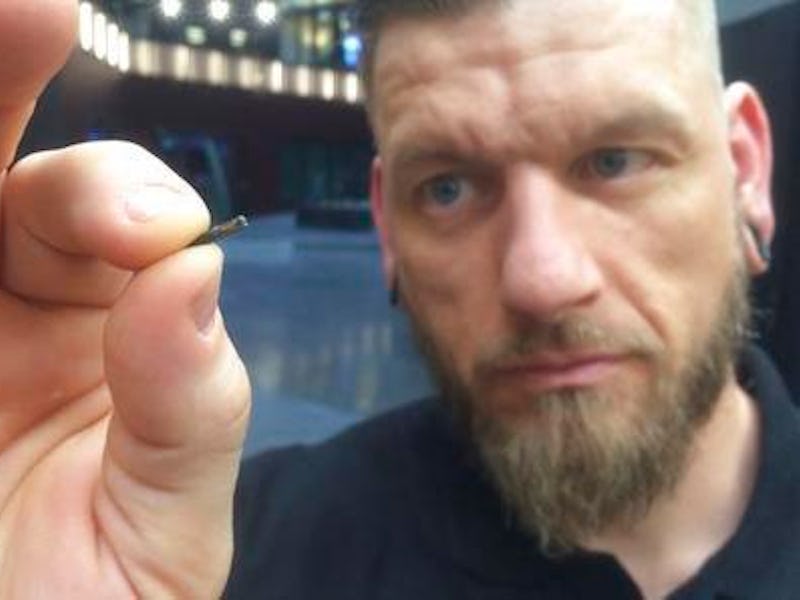Swedish Startup Implants Microchips Into Its Employees That Act as Swipe Cards
It can be used to make payments, open doors, and more.

In one of the first institutionalized instances of biohacking in the world, the Swedish startup hub Epicenter, which provides office space to innovative startups, has implemented a voluntary policy of implanting microchips into tenants of its office space. They have huge implications for the workplace, which may be full of cyborgs sooner than we think.
These tiny implants, injected into the soft tissue of the hand via a syringe, can be used in place of employee swipe cards. They can open doors, access printers, or purchase food from vendors on the premises. Much like a regular magnetic card or key fob, the chip is activated by passing it over a reader. Only, in this case, people are just waving their hands.
The implants use NFC technology, something already featured for use in things like mobile payments with a smartphone, so the technology itself isn’t something entirely new. Nor, says Epicenter founder and CEO Patrick Mesterton, the process of augmenting one’s body. At a demonstration of the new technology, Mesterton talked briefly about his initial trepidation with regards to the implants, but he explains why he ultimately came around to the idea:
People have been implanting things into their body, like pacemakers and stuff to control your heart. That’s a way, way more serious thing than having a small chip that can actually communicate with devices.
Benefits to companies and their workers could be wide ranging. Mesterton says, “The biggest benefit I think is convenience … it basically replaces a lot of things you have, other communication devices.” But, long-term, they could go well beyond that. Besides those obvious ones — no misplaced access cards and general convenience upgrades — implants like these, or even more advanced ones, could bring major changes to the office if they are popularized.
First and foremost, widespread use of these chips would constitute a massive upgrade to building security. It’s much harder to gain illicit access to a workspace if everyone who works there has a unique chip embedded in their hand.
Related to that security is better employee tracking. Companies will be able to determine when their employees enter the building in the morning and leave in the evening, as well as how many times and for how long they left during the day. Granted, this is already possible with current clock-in, clock-out methods, but it would be much more precise using these implanted devices.
Ben Libberton, a microbiologist from the Karolinska Institute in Stockholm, Sweden, tells the Associated Press:
“The data that you could possibly get from a chip that is embedded in your body is a lot different from the data that you can get from a smartphone.”
It even includes biological readings that could allow for companies to evaluate and better manage things like employee stress levels. An overworked workforce is ultimately an inefficient one, after all.
Of course, not all of the changes that could come from these implants will be positive. Concerns have already been raised about potential privacy violations resulting from businesses’ overuse of and micromanagement of these implants. Libberton points out that the sheer scale of the potential data provided by implants — data about your health, whereabouts, work habits, and work efficiency, even down to the number of bathroom breaks you take — raise some serious questions about appropriate ways to use them. If a more draconian company wants to enforce strict efficiency standards among its workers, the potential for abuse is clear. It, ironically, would make the stress levels of employees worse, not better.
For now, the Epicenter’s introduction of these sub-dermal devices is something to watch. As of right now, 150 people have gotten the voluntary implants. The reviews are good so far, with people reporting excitement at, as one of them put it, being “part of the future.”